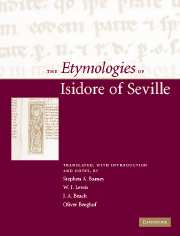Book contents
- Frontmatter
- Contents
- Acknowledgements
- Note to the Reader
- INTRODUCTION
- THE ETYMOLOGIES
- Analytical table of contents
- Book I Grammar (De grammatica)
- Book II Rhetoric and dialectic (De rhetorica et dialectica)
- Book III Mathematics (De mathematica)
- Book IV Medicine (De medicina)
- Book V Laws and times (De legibus et temporibus)
- Book VI Books and ecclesiastical offices (De libris et officiis ecclesiasticis)
- Book VII God, angels, and saints (De deo, angelis et sanctis)
- Book VIII The church and sects (De ecclesia et sectis)
- Book IX Languages, nations, reigns, the military, citizens, family relationships (De linguis, gentibus, regnis, militia, civibus, affinitatibus)
- Book X Vocabulary (De vocabulis)
- Book XI The human being and portents (De homine et portentis)
- Book XII Animals (De animalibus)
- Book XIII The cosmos and its parts (De mundo et partibus)
- Book XIV The earth and its parts (De terra et partibus)
- Book XV Buildings and fields (De aedificiis et agris)
- Book XVI Stones and metals (De lapidibus et metallis)
- Book XVII Rural matters (De rebus rusticis)
- Book XVIII War and games (De bello et ludis)
- Book XIX Ships, buildings, and clothing (De navibus aedificiis et vestibus)
- Book XX (Provisions and various implements)
- APPENDIX Correspondence of Isidore and Braulio
- INDEX
Book XII - Animals (De animalibus)
Published online by Cambridge University Press: 22 September 2009
- Frontmatter
- Contents
- Acknowledgements
- Note to the Reader
- INTRODUCTION
- THE ETYMOLOGIES
- Analytical table of contents
- Book I Grammar (De grammatica)
- Book II Rhetoric and dialectic (De rhetorica et dialectica)
- Book III Mathematics (De mathematica)
- Book IV Medicine (De medicina)
- Book V Laws and times (De legibus et temporibus)
- Book VI Books and ecclesiastical offices (De libris et officiis ecclesiasticis)
- Book VII God, angels, and saints (De deo, angelis et sanctis)
- Book VIII The church and sects (De ecclesia et sectis)
- Book IX Languages, nations, reigns, the military, citizens, family relationships (De linguis, gentibus, regnis, militia, civibus, affinitatibus)
- Book X Vocabulary (De vocabulis)
- Book XI The human being and portents (De homine et portentis)
- Book XII Animals (De animalibus)
- Book XIII The cosmos and its parts (De mundo et partibus)
- Book XIV The earth and its parts (De terra et partibus)
- Book XV Buildings and fields (De aedificiis et agris)
- Book XVI Stones and metals (De lapidibus et metallis)
- Book XVII Rural matters (De rebus rusticis)
- Book XVIII War and games (De bello et ludis)
- Book XIX Ships, buildings, and clothing (De navibus aedificiis et vestibus)
- Book XX (Provisions and various implements)
- APPENDIX Correspondence of Isidore and Braulio
- INDEX
Summary
i. Livestock and beasts of burden (De pecoribus et iumentis) 1. Adam was the first to confer names on all the animals, assigning a name to each one at the moment of its creation, according to the position in nature that it holds. 2. The different nations have also given names to each of the animals in their own languages – for Adam did not assign these names in the Latin or Greek language, or in any of the languages of foreign nations, but in that language which, before the Flood, was the language of all peoples, which is called Hebrew. 3. In Latin they are called animals (animal) or ‘animate beings’ (animans), because they are animated (animare) by life and moved by spirit. 4. Quadrupeds (quadrupes) are so called because they walk on four feet (quattuor pedes); while these may be similar to livestock, they are nevertheless not under human control – such as deer, antelopes, onagers, et cetera. But they are not beasts, such as lions, nor are they beasts of burden, which could assist the useful activities of humans.
5. We call any animal that lacks human language and form ‘livestock’ (pecus). However, strictly speaking, the term ‘livestock’ is usually applied to those animals that are either suitable for food, such as sheep and swine, or are suitable for use by humans, such as horses and oxen. 6. There is a distinction between the terms pecora (i.e. the plural of pecus, neuter) and pecudes (i.e. the plural of pecus, feminine), for the ancients commonly used to say pecora with the meaning “all animals,” but pecudes were only those animals that are eaten, as if the word were pecuedes (cf. esse, 1st person edo, “eat”).
- Type
- Chapter
- Information
- The Etymologies of Isidore of Seville , pp. 247 - 270Publisher: Cambridge University PressPrint publication year: 2006

